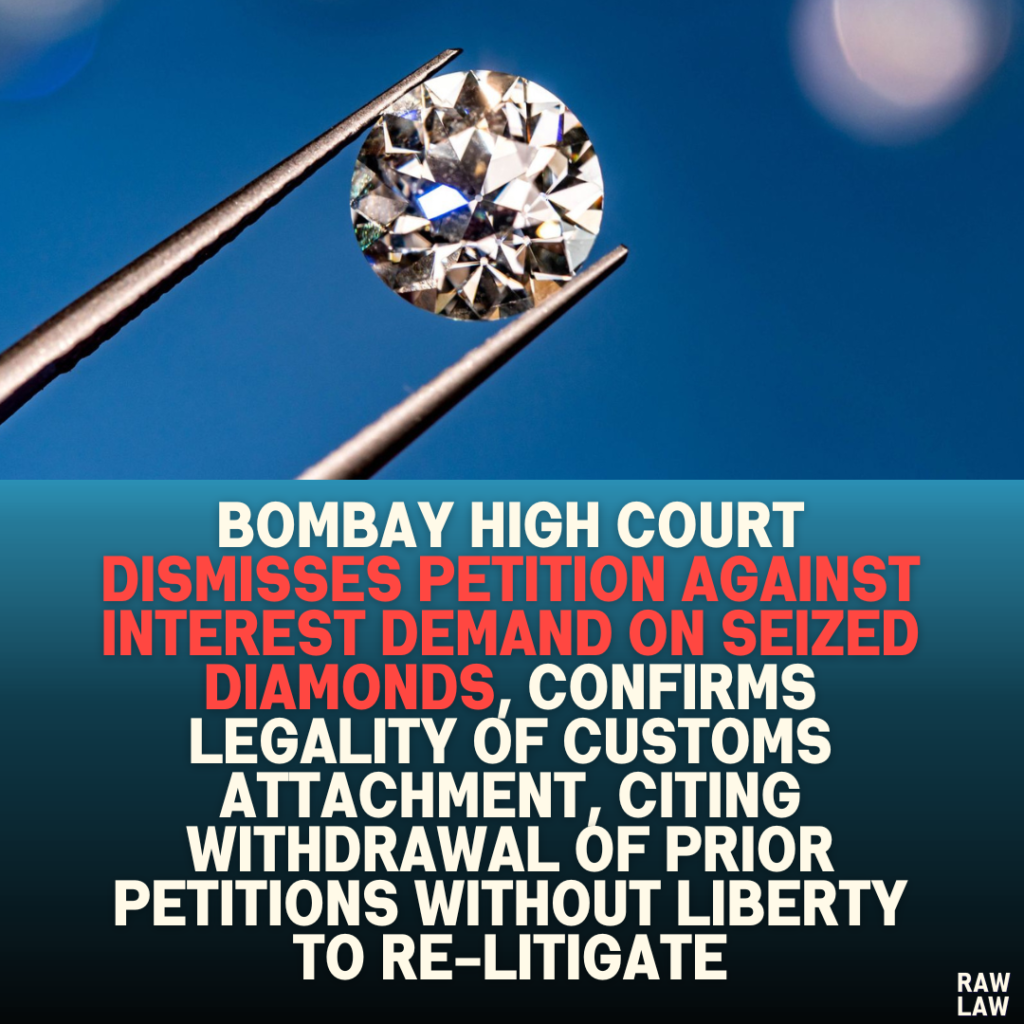Court’s Decision
The Bombay High Court dismissed B.V. Jewels‘ petition challenging the customs authorities’ continued attachment of its factory and the demand for interest on duty, ruling that the petitioner was liable for statutory interest under the Customs Act. The Court held that B.V. Jewels had defaulted on the full payment specified by the Supreme Court’s 2013 order and confirmed the legitimacy of interest demands and the factory attachment, affirming that no jurisdictional overreach was present.
Facts of the Case
- Petition Background: B.V. Jewels, a partnership firm in SEEPZ SEZ, Mumbai, engaged in exporting gold and diamond jewelry, sought the release of its factory premises and a refund of excess proceeds from previously seized diamonds. The case involved a customs duty dispute originating in a 2000 show cause notice and subsequent adjudications.
- Supreme Court Order Compliance: The Supreme Court, in 2013, permitted B.V. Jewels to discharge a duty and penalty of Rs. 24.63 crore in installments, mandating factory de-sealing upon full payment. The petitioner claimed compliance by August 2013; however, customs authorities argued that outstanding interest remained.
- Attachment Proceedings: The customs department had attached B.V. Jewels’ properties and its SEEPZ factory after issuing notices for unpaid interest under the Customs Act. Multiple appeals and applications were filed by B.V. Jewels before the Supreme Court and later the Bombay High Court, challenging these demands.
Issues
The central issue was whether B.V. Jewels had discharged its entire liability, as directed by the Supreme Court, by August 2013, and if the customs authority’s demand for interest and property attachment were lawful.
Arguments Presented
- Petitioner (B.V. Jewels):
- Claimed full payment of the duty and penalty under the Supreme Court’s order, arguing that the attachment and interest demand were arbitrary and beyond jurisdiction.
- Contended that interest was never specified in the initial adjudication order and that demanding it nearly a decade later was unreasonable.
- Sought de-sealing of the factory and cessation of further demands based on procedural compliance.
- Respondents (Customs Authorities):
- Asserted that the petitioner defaulted on the total payment specified in the Supreme Court’s order, with only Rs. 17.7 crore paid by August 2013, leaving an interest liability.
- Argued that interest under Section 28AA of the Customs Act applies automatically to unpaid duties, requiring no separate notice.
- Cited precedent affirming the statutory nature of interest demands and the legality of attachment for non-payment.
Court’s Observations
- Interest Demand: The Court held that statutory interest under Sections 28AA and 18(3) of the Customs Act is automatically enforceable upon duty default, rejecting the argument that delayed demand invalidated the claim.
- Compliance with Supreme Court Order: Observing the petitioner’s partial payment and default on full compliance, the Court found that B.V. Jewels was in breach of the Supreme Court’s conditions for property release and thus ineligible for de-sealing relief.
- Jurisdiction and Delay: The Court emphasized that B.V. Jewels had withdrawn previous petitions without liberty to re-litigate, which precluded them from challenging the interest demand anew before the High Court.
Conclusion
The Bombay High Court dismissed B.V. Jewels’ petition, affirming the statutory basis for the interest demand and supporting customs authority actions, including the attachment of the factory premises. The Court found that the petitioner had not cleared all dues per the Supreme Court’s order, and thus, the attachment was justified. The interim relief was vacated, and no costs were awarded.
Implications
This ruling underscores the judiciary’s strict stance on compliance with tax-related judgments and reinforces the automatic enforceability of interest under the Customs Act. It clarifies that attachment and interest demands are legitimate enforcement tools available to customs authorities upon duty non-payment, irrespective of delayed challenge attempts.
